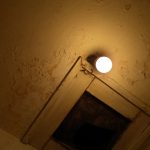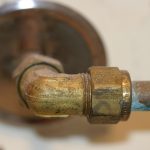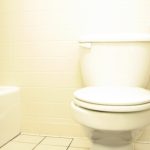When we run our faucet to get our drinking water, we expect a certain level of quality. We want our water to taste clean and fresh, and it shouldn’t have much of a discernible odor. If our water has an odd taste or odor, it may not necessarily be a health hazard, but it will make the water unpalatable for most people. It’s important to stay hydrated, and the last thing that you need is water that’s unpleasant to drink. In this article, we will take a look at five reasons why your water could taste and smell strange and look at some possible way to fix the problem.
1. A Metallic Quality
Some drinking water supplies contain elevated levels of metals, such as manganese, iron, and zinc. These metals are often found in mineral supplements that many people take to supplement their diet. In smaller quantities, these metals are necessary for many bodily functions, and they only become a problem when ingested in larger concentrations.
These metals often find their way into our water via older plumbing pipes and aging fixtures such as water heaters. If you have an older home, with lead pipes or plumbing fixtures that have been soldered with lead solder you could have lead leaching into your water too. All of these metals are next to impossible to detect with the human eye, and water testing is the only way to be sure that they are present.
One of the things that you may notice is that your water has a metallic taste and odor that makes it unpalatable to drink. The best way to fix this problem is to install a water filtration system to remove the metals and other contaminants. This could be an under the sink system for your kitchen or a whole house system to supply cleaner water to every faucet in your home.
2. A Moldy Taste and Musty Odor
Mold growth is a major problem in many different sources of water supply. The most common cause of your water tasting moldy and smelling musty is algae that is growing somewhere in your water supply. This is unpleasant to drink, but in most cases, it doesn’t represent much of a threat to your health.
The source of the moldy water may be somewhere else in your neighborhood, and it’s worth checking with your neighbors to see if they have noticed anything wrong. Get in touch with the local water supply company to see if anything has changed recently that could have affected your water quality.
If no-one else has a problem, then the source of your algae growth could be closer to home. Refrigerating your drinking water before drinking it can help to mitigate the worst of the moldy qualities. If you want a more permanent fix, it’s a good idea to clean your sinks, taps and other water fixtures thoroughly in your home. If the issue persists, it’s time to call a local certified plumber to identify and fix your moldy water problems.
3. A Sulfuric “Rotten Egg” Smell
There are few things that smell more disgusting than rotten eggs, and if your water starts to develop this odor, you will have a problem. This phenomenon is caused by hydrogen sulfide (H2S) in your plumbing system that will need to be fixed by a plumber. This usually occurs in a deep or shallow private well, but it can happen in surface water supplies under certain conditions.
The gas is actually trapped inside the water, and in many cases it’s colorless. This water is safe to drink, but it’s highly unlikely that anyone could stomach it for long. It’s important to understand that hydrogen sulfide can cause corrosion in your pipes and it could even cause your water to turn black.
For these reasons, it needs to be treated with an appropriate water filtration media. A local certified plumber will understand your local water conditions and they will be able to help you choose a filtration method that will meet your needs,
4. A Salty Taste or Ozone Odor
Some people find that their drinking water takes on a salty taste or an ozone like odor over time. If there is a mild salty taste, this could be an indication that there is chloride in your drinking water. If the water tastes very salty, it could be contaminated with sewage, and this is a serious problem. In either case, it’s essential to get a water test carried out as soon as possible to identify the exact cause.
5. A Sewage Smell
If your faucets and drinking water has a foul sewage odor similar to a rotten egg or dirty smell, then there could be a few different factors, such as a problem in your water heater or bacteria in your drain creating gases. We have covered the hydrogen sulfide “rotten egg” odor problem earlier in point three, so here we will focus on the sewage issue.
The water could smell like sewage because of bacteria from sources, such as soaps, food, and other materials that are sat in your drain. The bacteria will cause a gas to fill the drain; when you turn the water on this heavy gas is forced up and out into the air around the affected sink.
In some instances, the sewage odor may only be present if the hot water is turned on. This is a sure sign that bacteria are growing inside the water heater. This could happen if the water heater hasn’t been used for a while or if the temperature is set too low. This is not harmful to use, but it will be unpleasant, and the water tank will need to be fixed if you want to get rid of the sewage odor.
Here is a little test that you can do to determine if the sewage odor is coming from the water or your pipes. Fill a glass with water and move it away from the sink area before smelling it. If the water doesn’t smell bad, then the problem is in your pipes and drains. If you disinfect the sink and clean out the drain carefully with a brush, you can get rid of the smell. If this doesn’t work and you’re not sure what to do next call a
local certified plumber, and they will be able to help.
By Giovanni Longo President Flood Brothers Plumbing
Giovanni Longo is a 3rd generation master plumber who has been practicing his craft and trade in the greater Los Angeles area for well over a decade and a half. A plumbing and hydraulics-engineering innovator, Giovanni’s particular world-class expertise focuses on dealing with challenging sewer system designs as well as resolving complex commercial and residential draining issues. As a certified Flood Mitigation expert, he is also well versed in a wide variety of water damage and remediation solution.





